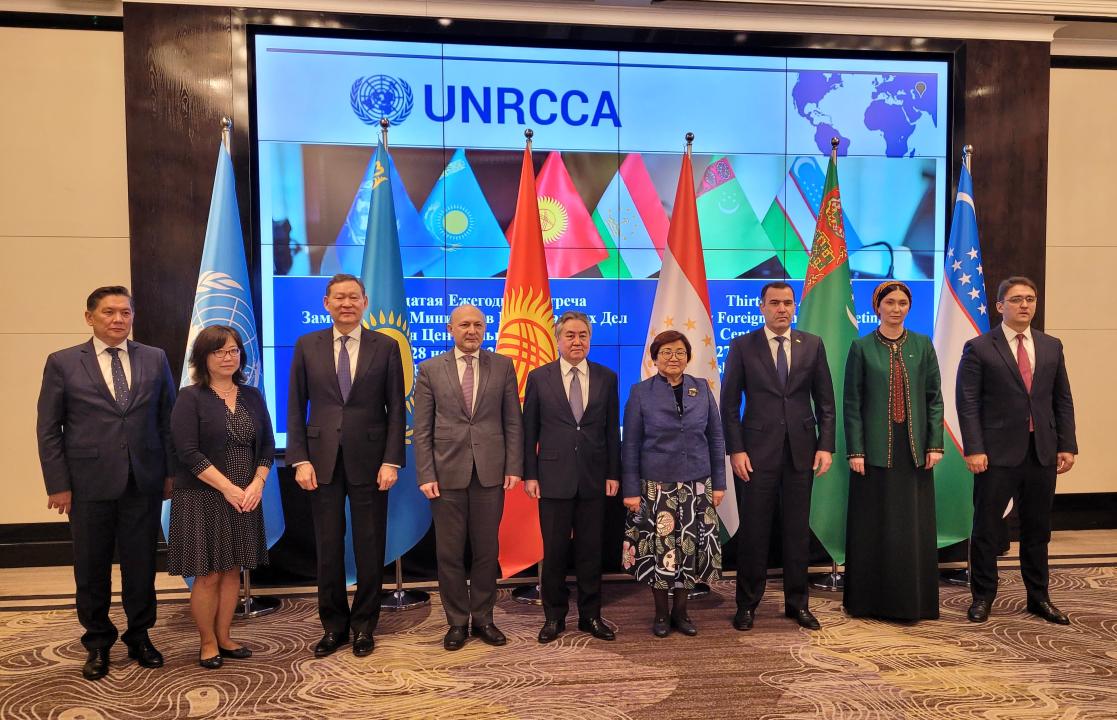ASTANA — First Deputy Minister of Foreign Affairs Kairat Umarov took part in the 13th annual meeting of Deputy Foreign Ministers of Central Asian countries on Nov. 28, organized by the UN Regional Center for Preventive Diplomacy for Central Asia (UNRCCA) and the Ministry of Foreign Affairs of the Kyrgyz Republic, ministry’s press service reported.

Delegations from Central Asian nations, distinguished figures such as the Special Representative of the UN Secretary-General for Central Asia, Kakha Imnadze, and the Special Representative of the UN Secretary-General for Afghanistan, Roza Otunbaeva, participated in the event. Photo credit: Kazakh Foreign Ministry.
The meeting’s goal was to exchange views on events and trends on a wide range of issues on the international agenda, including the security and cooperation of Central Asian countries, contribution to stabilizing the situation in Afghanistan, and interaction among Central Asian countries and UNRCCA.
Delegations from Central Asian nations, along with distinguished figures such as the Special Representative of the UN Secretary-General for Central Asia, Kakha Imnadze, and the Special Representative of the UN Secretary-General for Afghanistan, Roza Otunbaeva, participated in the event. Senior representatives of the UN Secretariat from New York were also present.
First Deputy Minister of Foreign Affairs of Kazakhstan Kairat Umarov highlighted the significance of the meeting in the face of global uncertainty and ongoing geopolitical tensions. He appreciated the active support of such meetings, stating, “We highly appreciate that the practice of holding these meetings is actively supported by cooperation in other formats.”
Umarov emphasized the rapid progress made by Central Asian countries in regional cooperation, attributing it to strong political will at the highest levels. Referring to President Kassym-Jomart Tokayev’s stance, he stated, “Systemic dialogue and coordinated actions are the most effective and, in fact, no alternative mechanism for solving common problems.”
Touching upon security and defense, Umarov mentioned President Tokayev’s initiative during the 5th Anniversary Summit of the Heads of State of Central Asia to hold a dialogue on security and cooperation in Central Asia at the level of secretaries of security councils. The minister also discussed Kazakhstan’s commitment to countering terrorism, citing it as one of the country’s key priorities during its non-permanent membership in the UN Security Council. Kazakhstan actively participates in the Joint Plan of Action to implement the UN Global Counter-Terrorism Strategy in Central Asia.
According to Umarov, Kazakhstan has been at the forefront of repatriation efforts for its citizens from conflict zones, notably in Syria and Iraq. He stressed the importance of addressing conditions that enable terrorism, including rehabilitation and reintegration programs. The minister also raised concerns about the rise in drug production, trafficking, and abuse, urging coordinated efforts among Central Asian countries. Kazakhstan, in July of this year, approved a Comprehensive Plan to combat drug addiction and trafficking for 2023-2025.
Umarov expressed Kazakhstan’s commitment to environmental initiatives, including creating the International Water and Energy Consortium of Central Asia. He highlighted President Tokayev’s proposal to establish a Project Office for Central Asian countries on environmental protection and climate change and hold a Regional Climate Change summit under the auspices of the UN in 2026 in Kazakhstan.
Kazakh minister also focused on peace and security in Afghanistan. Additionally, Special Representative of the UN Secretary-General for Afghanistan, Roza Otunbaeva, briefed the meeting participants on the situation in this country.
The Minister of Foreign Affairs of the Kyrgyz Republic, Jeenbek Kulubaev, also addressed the situation in Afghanistan, underlining its crucial role in regional security. He called for strengthened interaction and coordination among Central Asian states in addressing the challenges emanating from Afghanistan. The Kyrgyz minister also supported the UN Assistance Mission in Afghanistan and thanked UNRCCA for its active work in the region.
The meeting concluded with a commitment to ongoing collaboration, addressing shared challenges, and fostering regional stability and prosperity.
